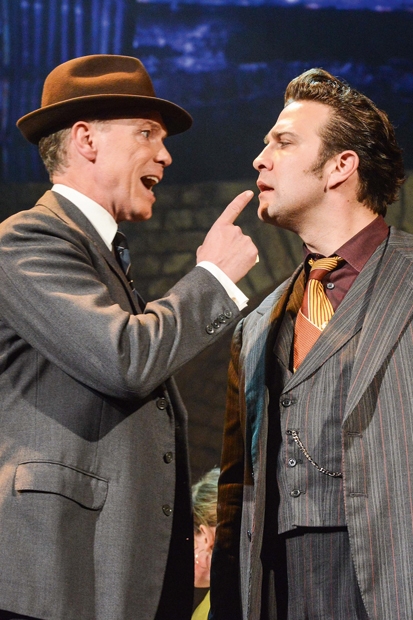Joan Littlewood’s greatest disservice to the theatre was to champion ‘the right to fail’, which encouraged writers and directors to inflict a thousand shades of bilge on play-goers for many decades. But she deserves a place in the pantheon for an inspired decision taken in 1959. Offered a new play about Soho’s underworld, written by the ex-con Frank Norman, she invited a young pop composer to turn it into a larky musical. Fings Ain’t Wot They Used T’Be opened at Littlewood’s East End lair and transferred to the Garrick where it ran for nearly 900 performances. The young composer was Lionel Bart.
Reborn at its original venue, this fantastic production reveals Bart’s musical inventiveness as it ascends towards the sublime heights it reached in his masterpiece Oliver! The opening feels similar. A homeless innocent, adopted by charming London scoundrels, is drawn into a life of criminality. The drama is underpinned by the social realities of the 1950s. Soho is changing. The ‘ponces’ (pimps) and their ‘brasses’ (hookers) feel threatened by unfamiliar new influences. Their beloved ‘palais’ (dance hall) has become a bowling alley. Parking meters have appeared ‘outside our doors to greet us’. And there are ‘kids in drainpipe trousers and poofs in coffee houses’. Bart’s flair for these compact little rhymes never falters, and though they seem a bit flat on the page they soar heavenwards when harnessed to his bewitchingly simple melodies. He gets laughs from violence too. ‘Once, in days of yore,’ sings an old gangster, ‘ponces killed a lazy whore.’
The main storyline, a turf war between a crime boss and an upstart rival, spawns a host of smaller side plots. An ageing brass urges her ponce to become a barrow boy. A recidivist tea leaf (thief) nicks a haul of goods that are accidentally resold to their upper-crust owner. A bent copper wants to become an honest crook and open his own ‘spieler’ (gambling den). This narrative richness gives the show the lived-in texture of a three-volume novel. The direction, by Terry Johnson, brims with energy and humour and every performance is bang on the money. Christopher Ryan stands out as Red Hot, a professional housebreaker. Ryan may be the size of a postbox, and about as threatening as a rocking horse, but his physical mastery is sublime and his sense of comedy faultless. Gary Kemp shines as Collins, the corrupt copper, whose smoochy duets with Suzie Chard’s Betty have a real sexual charge. In the final 20 minutes the show finds new levels of brilliance. A series of dramatic reversals, comic surprises and fabulous tunes draws us towards the evergreen classic ‘Living Doll’. And the gag of the night comes from Red Hot, who is asked to become a witness to a last-minute wedding. ‘Witness?’ he panics. ‘I’ve never witnessed anything in my life.’ I’d be astonished if this dazzling two-hour caper doesn’t follow its predecessor into the West End.
The Great War weep-in continues at Southwark Playhouse with an adaptation of Dalton Trumbo’s classic novel Johnny Got His Gun. It starts puzzlingly and soon becomes impenetrable. A monologue is being spoken by an English actor, wearing a 1918 uniform and a 1981 hair-do, who plays the role of an American volunteer recovering from a blast wound that sliced off half his face. The location shifts between the trenches, the surgery unit and the man’s half-remembered childhood, and the narrative thrust of the book vanishes beneath a barrage of wordy reminiscence and weird staging effects.
After the show, we were treated to a talk entitled, ‘How should we remember the first world war?’ hosted by the Stop the War coalition. This was far more intelligible, and more entertaining in its way, than the show itself. Stop the War had dispatched one of its four-star generals to spook us to death with dire warnings. Western leaders, this man told us, are hell-bent on fresh military adventures. Therefore the ceaseless vigilance of Stop the War is more precious than ever.
It should be pointed out that recent events don’t quite bear out his analysis. Iraq: concluded. Afghanistan: concluded. Libya: limited intervention. Syria: noisy brinkmanship. Ukraine: irascible huffing and puffing leading to impotent neutrality. His upside-down history lesson continued as he informed us that Britain’s decision not to attack Syria last autumn was enforced by a thousand Stop the War protestors striding around Parliament Square. Compare that with the million-strong march in 2003, prior to the invasion of Iraq, and you reach the inescapable conclusion that Stop the War has become much more efficient at stopping wars. A thousand times more efficient, in fact. Which is great news. Next time an illegal conflict is being planned by blood-crazed politicians, the disaster can be averted by a single bongo-playing crustie ambling down Whitehall with a mongrel on a draw-string. Beat that, Nato.






Comments